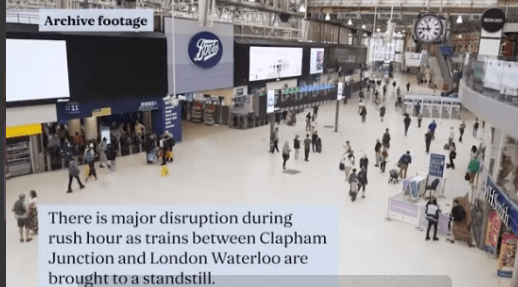
Commuters encountered significant upheaval between Clapham Junction and London Waterloo following a tragic incident where an individual lost their life on the tracks.
READ: New York Businesses Ordered to Require Masks Indoors or Vaccine Proof
Clapham Junction
The British Transport Police received a distressing report shortly after 7:30 a.m. on Wednesday, alerting them to a casualty on the tracks near Clapham Junction station. Tragically, the individual was pronounced deceased at the scene.
South Western Railway swiftly responded to an emergency call from a train positioned between the affected stations, prompting the suspension of all train services in the vicinity on Wednesday morning.
National Rail promptly issued warnings, indicating that disruption is anticipated to persist until 4 p.m., further exacerbating the challenges faced by commuters in the region.
In addition to the railway disruptions, passengers relying on the Tube encountered additional hurdles due to announced strike actions by Aslef. The union disclosed plans for two one-day walkouts, scheduled for Monday, April 8, and Saturday, May 4, intensifying the disruptions experienced by travelers relying on public transport services.
Furthermore, motorists were cautioned about potential disruptions during the morning rush hour following a severe collision that resulted in the closure of the M26 in Kent. The eastbound lanes between the M25 and the M20 were rendered impassable due to the accident, which involved a car and a van and occurred around 11 p.m. on Tuesday night.
The closure of the motorway not only impeded the flow of traffic but also posed logistical challenges for commuters and travelers relying on this route for their daily commute or other essential journeys.
The combination of these unfortunate incidents underscores the considerable challenges faced by commuters and travelers alike. From railway disruptions to road closures, the impact reverberates across various modes of transportation, exacerbating the inconvenience and uncertainty experienced by individuals navigating their daily routines.
Efforts to mitigate disruptions and restore normalcy to transportation services are undoubtedly underway, with authorities and transportation agencies working diligently to address the aftermath of these incidents and alleviate the associated inconveniences.
However, in the interim, affected individuals are urged to exercise patience and vigilance, while exploring alternative routes and transportation options where feasible. Additionally, heightened awareness of safety protocols and adherence to traffic regulations are paramount to ensuring the well-being of all road users and commuters during periods of heightened disruption and congestion.
Ultimately, while unforeseen incidents such as these may disrupt daily routines and travel plans, they also underscore the importance of resilience, adaptability, and community support in navigating challenges and overcoming adversity. By coming together and supporting one another during times of crisis, individuals and communities can weather the storm and emerge stronger and more resilient in the face of adversity.